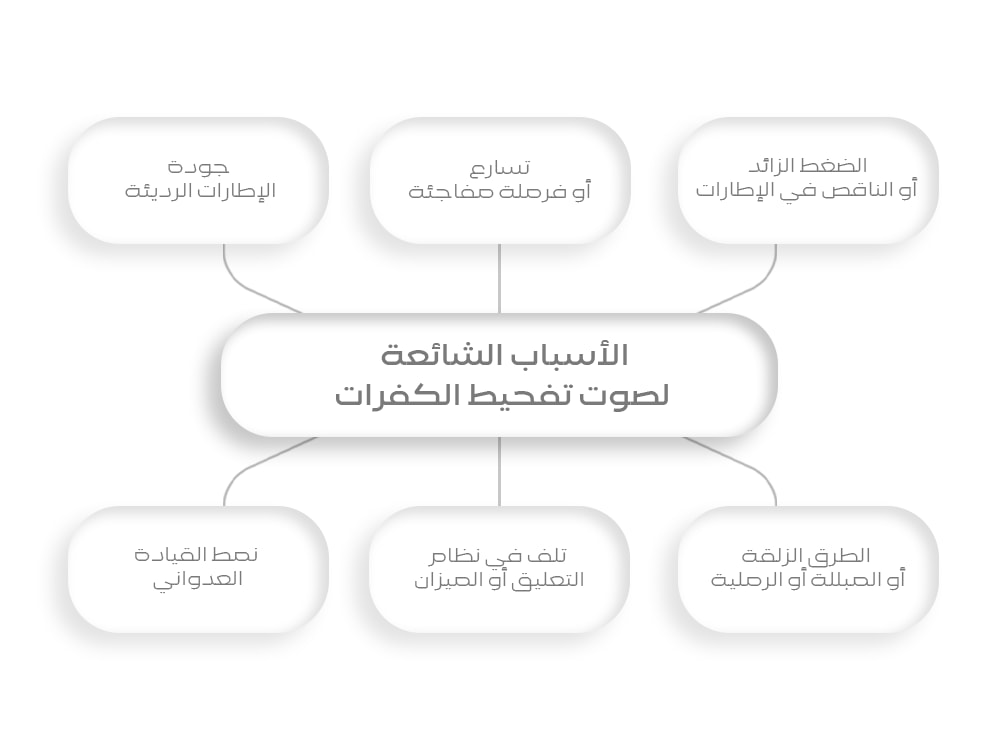The sound of tires screeshing may seem normal to some, or even an exciting show on the road, but in fact it may be a sign of silent danger, a warning of an imbalance, or even evidence of internal damage to a tire.
According to a report issued by the American Traffic Safety Association (NSC) in 2022, 12% of accidents related to loss of vehicle control are due to unexpected screeshing that occurred at medium or low speeds, often due to improper pressure or a defect in the type of tire.
In this article, we will explain in detail what causes this sound, when it is normal, when it becomes a real problem, and most importantly how to avoid it and choose the right tire to give you a quiet and safe ride.
What is the sound of screeshing tiresand what causes it physically?
The sound of a tire is the sound of a tire sliding on the road surface when it loses grip for a moment. It usually occurs when the thrust or braking force exceeds the ability of the tire to grip. It starts to slip. The sound it makes is caused by the rubber rubbing the dry or wet ground.
Scientifically, this phenomenon is called loss of traction or instantaneous loss of grip. It is caused by a sudden difference in speed between the rotation of the tire and the road surface. Whenever the road surface is smooth, the pressure is not appropriate, or the pattern in the tire is worn, the more likely it is to hear this sound.
In a 2020 Bridgestone survey of more than 1,500 drivers in the Middle East, 39% of respondents indicated that they had heard a screeshing sound in their cars in the past three months without knowing the cause, while it was found that more than half of those cases were related to pressure problems or tire engravings.
Common causes of the sound of screeshing tiresare:
There are many reasons for the sound of tires screeshing, including deliberate, technical things related to covers and the technical condition of tires. Here are the most common causes of the sound of tires screeshing:

- Excessive or underpressure in tires:
If the air inside the tire is less or more than recommended, the contact surface with the road changes, making it more likely to slip.
Also, a tire that has been inflated in an exaggerated manner leads to less contact with the surface and therefore less grip, and vice versa. A tire with a lack of air makes the tire flattened and increases its lateral friction, creating a louder sound when cornering.
According to a study from the Continental Research Institute in 2021, 47% of momentary slips in civilian cars are caused by unbalanced pressure between the four tires.
- Sudden acceleration or braking:
When you suddenly press the accelerator or brake pedal, especially in turns, the tire is forced to change its state of motion quickly, resulting in temporary slippage and a clear screeshing sound. This may be normal in some cases, but it is doubled if the tires are damaged or the ground is slippery.
- Poor tire quality:
Tires made of low-quality rubber do not have sufficient grip and therefore make buzzing sounds even in mild driving conditions.
Some cheap commercial tires lack the technology to guide grooves and drain water, which increases the risk of slipping.
- Slippery, wet or sandy roads:
If the road is wet or has a layer of sand, the friction between the tire and the ground becomes less. Even good tires may make a screeshing sound in these cases, but it is often soft and scattered, rather than sharp as in dry slip.
- Damage to the suspension or balance system:
When wheel angles are misaligned or there is damage to the suspension system, the tire does not make proper contact with the ground. This creates excessive lateral friction and leads to frequent screeshing sound, even at low speeds.
- Aggressive driving style:
Sharp turns, sudden acceleration, and harsh parking all wear out the tires and increase the likelihood of loss of grip.
Driving in this mode also accelerates the wear of the pattern and produces a screeshing sound even in normal conditions.
When is the sound of bombing a sign of danger?
There are a number of cases that make the sound of the bombing an indication of danger in the vehicle in general, These cases include the following:
- There is a permanent overload on the vehicle:
When the car is overloaded, the pressure on the tires increases, which increases the likelihood of skidding and screeshing sounds when cornering or accelerating.
- Using tires that do not suit the nature of driving:
Some drivers use tires for quiet roads in environments that require higher grip, such as mountainous or desert areas, resulting in poor acoustic and frictional response.
- Slow braking system response or poor stability systems:
If the ABS and ESP systems are not working efficiently, the car loses the ability to properly distribute the braking force, causing the tires to slip at every sudden stop.
- Additional reasons too:
- If it is repeated even on straight roads or low speeds.
- If you notice that the sound is accompanied by a concussion or vibration.
- If you see uneven wear in the tire surface.
- If cracks or metal wires appear on the surface of the case.
All of the above reasons are not just a symptom... but a mechanical warning that deserves examination.
How do you avoid the sound of tires screeshing?
Experts always recommend keeping an eye on the behavior of tires in all circumstances, because some sounds may be temporary or caused by an overload or a change in road temperature, while others are an indication of a real defect that should be treated immediately, so you should do the following:
- Check air pressure once every two weeks.
- Do not accelerate or stop the car suddenly, especially in corners.
- Rotate the tires every 10,000 km to ensure balanced wear.
- Check the suspension and balance system at every regular maintenance.
- Use reliable and certified tires.
According to a report issued by the U.S. National Transportation Safety Authority (NHTSA) in 2021, more than 37% of cases of loss of control related to tires were due to inappropriate pressure or the use of tires that were not suitable for the type of road.
The same study indicated that adherence to regular maintenance (including checking pressure, balance, and appropriate type of tire) reduces sudden slip accidents by up to 41% . ,
Therefore, regular maintenance, the right choice of tire, and moderate leadership behavior are all effective factors in avoiding unwanted sounds of bombing.
Why do your trail tires give you silent grip?
The most important feature of the Darbek tire is that it has obtained the Saudi quality mark SASO, which is not granted to any brand unless its product passes dozens of tests. Among these tests are related to the stability and grip of tires and hence the rare sound of tires, unless the driver deliberately makes these sounds out of entertainment or show off.
It is very important to note that we are talking about a healthy tire within the specified period, which does not exceed 6 years. When this period is exceeded or the tire is injured and exposed to external damage, it will certainly not be effective and will make a screeshing sound when used incorrectly.
What distinguishes a Darbek tire from other tires is the following:
- A smart distributed pattern reduces accidental slipping.
- High quality rubber absorbs shock and reduces vibration.
- Performance tests showed a 29% reduction in frictional sounds compared to competing tires.
- Special design to deal with Gulf roads and sharp corners.
In conclusion...
The sound of infidels may be fun in movies, but it's actually a warning sign.
Listen to your car, understand its messages, and take care of your tires like you take care of your brakes and engine.
And remember... With your path, you can only hear the voice of trust... and calm.







